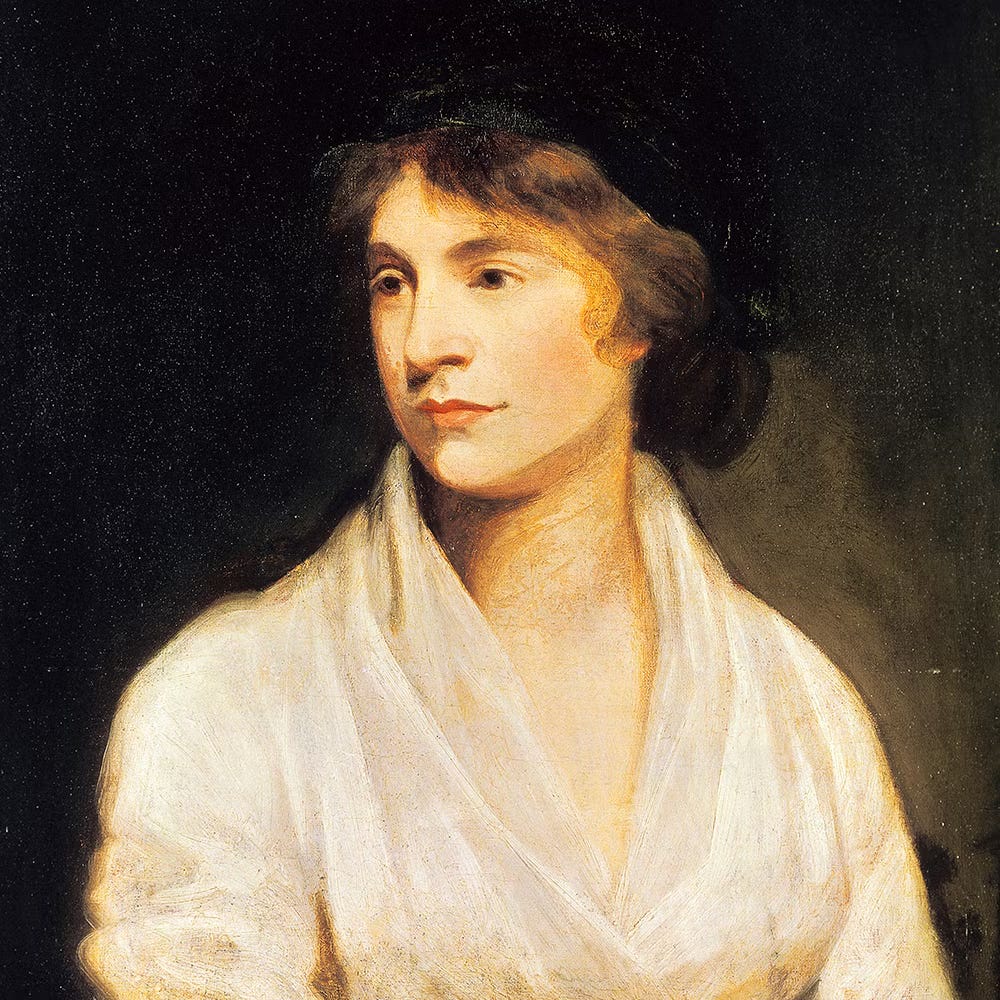The Odds Were Against Her
Book Spotlight - Solitary Walker: A Novel of Mary Wollstonecraft
If you’ve been here for a bit, you know I love sharing stories that highlight women from the past. I find their lives inspirational and motivational!
Today I’m delighted to share with you a guest post from N.J. (Nancy) Mastro who has a new release about Mary Wollstonecraft. I’m really looking forward to learning more about Mary’s life and her impact on feminism.
Before we jump into all the interesting tidbits from Nancy, I have a quick poll for you.
I’m working on what my content plan looks like and would love your input. I want to focus on sharing a balance of historical fiction, author spotlights, day in the life of an author assistant, as well as helping to amplify diverse and and indie author romances.
What I would love to know if how often you would like to hear from me.
Welcome, Nancy!
Women’s History Month is upon us.
Who better to celebrate than Mary Wollstonecraft, who in 1787 moved to London to live by her pen and ended up earning the distinction of being known as the world’s first feminist?
The odds of success were against Wollstonecraft when she decided to become a writer. The twenty-eight-year-old spinster had but one advice book to her name, had just been fired from her position as governess to the three eldest daughters of the wealthiest family in Ireland, and was homeless. As if those trials weren’t despairing enough, she owed a massive amount of debt after her school for girls went under the prior year, and she was mourning the death of her best friend. When she stepped onto the cobblestones in St. Paul’s Churchyard, she couldn’t have imagined she’d become one of history’s leading female philosophers.
Or did she?
“I am then going to be the first of a new genus,” Wollstonecraft wrote to her sister Everina in November 1787, two months after arriving in London. “I tremble at the attempt yet if I fail — I only suffer.” Clearly, she had already set her sights on greatness. But on what basis?
Wollstonecraft is the subject of Solitary Walker: A Novel of Mary Wollstonecraft in which I tell the story of Wollstonecraft’s unlikely rise as a writer and philosopher. My favorite genre, biofiction allows readers access to historical figures without having to slog through biographies, which can be tedious and boring. I chose Wollstonecraft because of the intense nature of her personality. She was a brilliant woman who sometimes did foolish things. Who doesn’t know a woman like that? She was flawed, which makes us love and appreciate her all the more. Despite her iconic status as the mother of feminism, she was human, like the rest of us. Her actual life had all the right elements of fiction: drama, intrigue, heartache, and profound victory. She was absolutely fascinating to write about.
At first, Wollstonecraft didn't tell her family that she’d lost her job or that she’d moved permanently to London to become a writer. She feared they would tell her she was being irrational. Mary’s family, a dysfunctional one at that, had fallen into poverty and depended on her for money. She knew they would not have approved of her chasing what they would have considered a wild whim. But Wollstonecraft knew that she was different from other women her age. Months passed before she finally wrote to her sister Everina, reminding her she had long wanted to become a writer. “You know I am not born to tread on the beaten track — the peculiar bent of my nature pushes me on.”
An independent thinker in an era when society taught women and girls little more than how to be pleasing and serve the men in their lives, she had already shown a predisposition toward pushing against rules that kept women subservient. She’d broken from her family, refused to dress in the latest fashion, and took pride in viewing the world through a critical lens. Within five years of arriving in London, she would write an enduring body of work still revered more than two centuries later. Her overarching message in A Vindication of the Rights of Woman, her most famous text: “Strengthen the female mind by enlarging it, and there will be an end to blind obedience.”
It’s hard to appreciate how stunning her achievements really were. Today we’d think nothing of a woman striking out on her own to make her way in the world, but in the 18th century, a middle-class woman making a living based solely on her writing was unheard of. Paid far less than men, female writers relied on family means to augment their earnings.
Or the financial shelter of a husband.
No, thank you, Wollstonecraft said. She viewed marriage with a wary eye after growing up at the hands of a brutal father who squandered the family fortune. Edward Wollstonecraft routinely assaulted his wife physically and sexually. At 12, Mary would stand guard outside her mother’s bedroom late at night to protect her from his violent outbursts when he’d come home after a night of drinking and gambling. Mary and her siblings also suffered physical abuse at his hand. Witnessing and being the recipient of this type of treatment affected Mary, leading her to conclude husbands held undue power over wives, power granted them by society and the law. As a means of self-protection, she vowed to sidestep marriage altogether, believing men held too much potential to become tyrants like her father.
Yet it was a man’s world Wollstonecraft stepped into when she arrived in London in August 1787, and the stakes were high. She had only herself on whom she could rely. If she failed to earn enough to pay her bills, she would end up in debtor’s prison. Wollstonecraft went directly to her publisher, Joseph Johnson, who had a printing business and bookshop in the Churchyard. In her bag she carried a novel she had written in Ireland and presented it to him in hopes he would publish it. More importantly, Wollstonecraft carried deep within a quality neither poverty nor sorrow could take from her: an uncanny belief in herself.
As the title of the novel she handed Joseph Johnson that day suggests, Mary: A Fiction was highly biographical. In braiding the themes of autonomy, compassion, and resistance to traditional roles prescribed for women, Wollstonecraft harvested events from her own life and borrowed individuals she’d known to serve as props to deliver her message of warning to women: beware your choices lest they trap you in a life not of your own choosing.
Joseph Johnson enthusiastically agreed to publish the novel, sensing in Mary a spirited individual with a unique voice, one that would appeal to a growing female readership. Industrialization was underway in England, sparking questions regarding the role of women, and literacy rates among women were on the rise.
Joseph Johnson didn’t just publish the novel. He gave Wollstonecraft a job as a translator, promised to publish whatever else she wrote, and gave her a place to stay before helping to find her permanent lodging. Theirs would become a partnership now famous. His mentorship was of no small consequence; Johnson was one of London’s most prolific publishers during and after Mary’s lifetime.
But while Johnson may have opened doors for Mary, it was she who walked through them and claimed a literary landscape in which she wrote compellingly about the state of girls and women. The role came naturally to her, and she was armed. Wollstonecraft was confident and had already formed opinions about liberty, natural rights, and the inherent freedom of the individual. Largely self-taught, she’d read a wide range of Enlightenment texts. Prior to meeting Johnson, Wollstonecraft also had benefitted from previous mentors, Dissenters who had broken with the Church of England. When she penned A Vindication of the Rights of Woman in 1792, ideas that had been germinating for decades came into full bloom. Willing to risk it all, she wielded her pen with the precision of a warrior, securing her place in history for centuries to come. No one has toppled her since.
On a personal level, Wollstonecraft led a less-sure existence. Tripping up the firebrand just as her writing career flourished was a growing desire for intimacy. Ill-fated forays into love seemed inevitable for this fierce woman. In time she struggled over where to direct her passion. The strictures of her time left her little room to maneuver sexually; her reputation was always on the line. If she acted with too much indiscretion, she would be finished as a writer. Her ability to support herself would be gone, and she would lose her independence, which meant more to her than life itself. In typical Mary Wollstonecraft fashion, she tried to have it all. Disaster ensued, leading her to experience her life’s darkest moments.
It's impossible to deny Mary Wollstonecraft’s place in history. Nor should we try. When women achieve greatness, it is in all our interests to keep their memories alive by visiting and revisiting them. Their stories are our stories. Although times have changed since Wollstonecraft arrived in London in 1787, her struggle for independence was not all that different from anyone’s goals today: to achieve financial stability, make lasting connections with others, and engage in work that makes a difference. Some things will always stay the same. Who doesn’t want freedom and autonomy? To create a life of meaning and purpose? Mary Wollstonecraft did, and she made it happen despite incredible obstacles. In doing so, she offers modern women — and men — inspiration worth embracing.
N.J. Mastro is the author of Solitary Walker: A Novel of Mary Wollstonecraft. Set against the backdrop of 18th century London, Paris during the French Revolution, and the remote shores of Scandinavia, Solitary Walker is biofiction about Wollstonecraft’s incredible rise as a writer and her ill-fated forays into love. Find it at online bookstores or visit njmastro.com for purchasing information.
I love the idea of biofiction and finding a more accessible way to highlight the stories of these amazing women. I would love to know some women who you would like to see written about in the future.
Here’s a list of some Substacker’s to check out who share amazing history posts highlighting women in history.
* for every membership updated to $5, I donate a historical fiction or romance book to a local women’s shelter. Want to choose what book is donated? Just send me a message after you subscribe.
The Literary Assistant is Reader-Supported! Thank you so much for being part of this community! If you love the recommendations and would like to show your support, it means the world to me—THANK YOU! 💛
Please note, all posts are free for everyone to enjoy. Your support helps keep this space thriving for book lovers like you! 😊 You can support this space for only $5 a month.
Affiliate links are used at no extra cost to you, but they help me earn a small amount—just enough to grab a coffee and keep writing! ☕






I needed this today. Thank you!
I love this!! I teach Mary Wollstonecraft and desperately need another book about her to read!